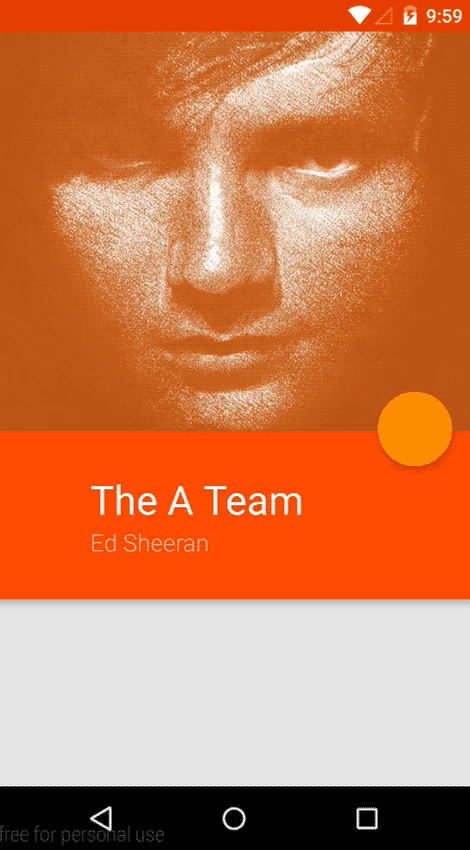How to fill a view with another with Material Design Animation?
I tried to implement this below API 21
add gradle dependancy
dependencies {
compile 'com.github.ozodrukh:CircularReveal:1.0.6@aar'
}
My activity xml is
activity_reval_anim.xml
<RelativeLayout
xmlns:android="http://schemas.android.com/apk/res/android"
xmlns:app="http://schemas.android.com/apk/res-auto"
xmlns:tools="http://schemas.android.com/tools"
android:layout_width="match_parent"
android:layout_height="match_parent"
tools:context=".RevalAnimActivity">
<ImageView
android:id="@+id/img_top"
android:layout_width="match_parent"
android:layout_height="200dp"
android:layout_alignParentLeft="true"
android:layout_alignParentStart="true"
android:layout_alignParentTop="true"
android:background="@color/color_primary"
android:src="@drawable/ala"/>
<io.codetail.widget.RevealLinearLayout
xmlns:android="http://schemas.android.com/apk/res/android"
android:layout_width="match_parent"
android:layout_height="200dp"
android:layout_below="@+id/img_top"
android:background="@color/color_primary">
<LinearLayout
android:visibility="invisible"
android:id="@+id/ll_reveal"
android:layout_width="match_parent"
android:layout_height="match_parent"
android:background="@color/color_accent"
android:orientation="horizontal"
></LinearLayout>
</io.codetail.widget.RevealLinearLayout>
<ImageButton
android:id="@+id/img_floating_btn"
android:layout_width="60dp"
android:layout_height="60dp"
android:layout_alignParentRight="true"
android:layout_marginRight="40dp"
android:layout_marginTop="170dp"
android:background="@drawable/expand_btn"/>
</RelativeLayout>
My Activity java is
RevalAnimActivity.java
public class RevalAnimActivity extends ActionBarActivity {
@Override
protected void onCreate(Bundle savedInstanceState) {
super.onCreate(savedInstanceState);
setContentView(R.layout.activity_reval_anim);
final ImageButton mFloatingButton = (ImageButton) findViewById(R.id.img_floating_btn);
mFloatingButton.setOnClickListener(new View.OnClickListener() {
@Override
public void onClick(View v) {
animateButton(mFloatingButton);
}
});
}
private void animateButton(final ImageButton mFloatingButton) {
mFloatingButton.animate().translationXBy(0.5f).translationY(150).translationXBy(-0.9f)
.translationX(-150). setDuration(300).setListener(new AnimatorListenerAdapter() {
@Override
public void onAnimationEnd(Animator animation) {
super.onAnimationEnd(animation);
animateReavel((int) mFloatingButton.getX(), 150,mFloatingButton);
}
});
}
private void animateReavel(int cx, int cy, final ImageButton mFloatingButton) {
final View myView = findViewById(R.id.ll_reveal);
// get the final radius for the clipping circle
float finalRadius = hypo(myView.getWidth(), myView.getHeight());
SupportAnimator animator =
ViewAnimationUtils.createCircularReveal(myView, cx, cy, 0, finalRadius);
animator.addListener(new SupportAnimator.AnimatorListener() {
@Override
public void onAnimationStart() {
mFloatingButton.setVisibility(View.INVISIBLE);
myView.setVisibility(View.VISIBLE);
}
@Override
public void onAnimationEnd() {
Toast.makeText(getApplicationContext(), "Done", Toast.LENGTH_LONG)
.show();
}
@Override
public void onAnimationCancel() {
}
@Override
public void onAnimationRepeat() {
}
});
animator.setInterpolator(new AccelerateDecelerateInterpolator());
animator.setDuration(1000);
animator.start();
}
static float hypo(int a, int b) {
return (float) Math.sqrt(Math.pow(a, 2) + Math.pow(b, 2));
}
}
The solution to do that is pathInterpolator and the name of this effect is Curved Motion.
Animations in material design rely on curves for time interpolation and spatial movement patterns. With Android 5.0 (API level 21) and above, you can define custom timing curves and curved motion patterns for animations.
You can see how to implement it here :
http://developer.android.com/training/material/animations.html#CurvedMotion
And sample on GitHub HERE :
